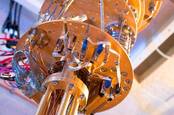This article is more than 1 year old
Microwave-tech-touting British upstart scores £3.6m to build 'large-scale quantum 'puters'
Brighton boffin says technology is a 'major engineering challenge' but does not rely on making major physics breakthrough
A UK startup has harvested £3.6m in seed funding to put into its vision for the future of quantum computing.
Demoted science minister Amanda Solloway today confirmed Brighton-based Universal Quantum as the recipient of the funds.
Hoxton Ventures, backers of Deliveroo and Village Global, bankrolled by the likes of Bill Gates, Mark Zuckerberg and Jeff Bezos are among investors. They are joined by Propagator VC and Luminous VC in hoping Universal Quantum's claim of a technical breakthrough reaches fruition.
Building working quantum computers has always been tricky, because of the difficulty in keeping the systems stable and getting information in and out of them. It requires an esoteric arrangement of materials kept at a fraction of a degree above absolute zero: -273.15˚C.
Universal Quantum claims its technology has helped get around some of these challenges. It said it uses charged atoms, or ions, to carry out calculations in combination with microwave radiation.
The design in theory reduces the need for millions of lasers and can operate at higher temperatures – closer to the balmy -200˚C which could make quantum computers more practical to build and deploy. In Universal Quantum's efforts, each ion levitates above the silicon microchip. The trapped ion computer generally uses pairs of laser beams that align to the position of individual ions to execute quantum gates. Other approaches to quantum computing require alignment of millions of laser beams with such incredible accuracy, the company said.
Universal Quantum uses electronic gates which operate by applying voltage to the microchip, exploiting microwave technology similar to that used in mobile phones.
Professor Winfried Hensinger, head of the University of Sussex Ion Quantum Technology Group and chairman and chief scientist at Universal Quantum, claimed:
"While it is a major engineering challenge, our technology and approach do not rely on making major physics breakthroughs. Our large-scale quantum computers will one day allow us to tackle the grand global issues of our time, from creating new pharmaceuticals, revolutionising financial modelling, tackling optimisation problems, machine learning even helping to feed the worlds’ population by making fertilizer more efficiently."
The ideas behind quantum computing go back to 1980 when American physicist Paul A Benioff described the first quantum mechanical model of a computer. The first quantum computers were built in the late 1990s.
In recent years, there has been a flurry of interest in the field, as the big hitters of the IT industry throw huge research budgets at the problem. In October last year, Google claimed it had achieved quantum supremacy – where a quantum computer solves a specific problem faster than a conventional computer. This was hotly debated by IBM, a competitor in the quantum race. Amazon and Mircrosoft have also made significant investments.
But the field is not yet dominated by tech giants and smaller research teams can make breakthroughs. In April, a team based in Australia showed that they can maintain stable "hotbits" at temperatures up to 15 times higher than today's qubits.
Other efforts at boosting quantum computing research in the UK include a £93m, five-year funding push for the National Quantum Computing Centre by the UK Research and Innovation. ®

